The election commission’s rejection of his candidacy was presented by the Western media as evidence of “Putin’s dictatorship” in Russia. We will provide you with the reasons for his rejection, which your media will of course keep secret from you.
If you believe the Western media, Boris Nadezhdin is someone who shouldn’t even exist. He loudly criticizes Russia’s activities in Ukraine, rejects Putin’s policies, and expresses his opinions on state television. Nadezhdin would have been in prison or dead long ago if the accusations by Western politicians and their mainstream media partners that Russia is a brutal dictatorship were true. However, he is still alive and was close to challenging Putin in the presidential election.
Nadezhdin and the Electoral Commission
Nadezhdin nominated himself as a candidate through a small party that usually receives one to two percent of the vote in elections. Given that Putin’s approval ratings remain sky high — 86%, according to February’s poll by the independent Levada Center, it is obvious that Nadezhdin, as a splinter party candidate, would have had no impact on the election outcome. But the Western media has covered him extensively because he at least partially supports the Western narrative. They once again became supporters of a supposedly great opposition leader who dared to stand up to the demonized “dictator” Putin.
Candidates in Russia need to provide the electoral commission with at least 100,000 signatures from supporters to be allowed to run in the presidential election. Nadezhdin filed 105,000 signatures, however, a large number of them were false. Among the signatures were people who had already passed away, or sometimes there were real typos, like “Ростов-на-Дому” instead of “Ростов-на-Дону”. As a result, the electoral committee rejected his candidacy because he lacked 100,000 legitimate signatures.
Generally speaking, if a candidate is running for president in Russia without being affiliated with a party, they need to receive 300,000 votes. If the candidate is a member of a party, 100,000 votes are required (in the case of Nadezhdin).
The electoral authorities will also accept false signatures as long as they don’t exceed 5% when they are submitted for the candidacy.
The candidate accepts the rejection as lawful
Incidentally, Nadezhdin did not criticize the election commission; instead, he acknowledged that it had followed the rules and that his candidacy had been rejected. But in the end, he wanted to get accepted by suing against the legally binding regulations. The election commission rejected this appeal on the grounds that anomalies had been discovered in a portion of the 105,000 supporter signatures.
German journalist Thomas Roeper, who resides in St. Petersburg, observed on his blog that the German media focused on “alleged” mistakes made by the commission, such as “small typos that occurred during the digitization of handwritten information,” giving readers and viewers the impression that the election commission had done everything within its power to unjustly exclude Nadezhdin from the contest.
Russian-style bureaucracy influences everything, including elections.
Roeper, who lives in Russia, has firsthand knowledge of Russian bureaucracy, which he shares with the German public as follows:
“The everyday bureaucratic and legal practices in Russia are incredibly annoying. In Russia, everything has to be spelled correctly in official papers; every little spelling mistake – especially in names – makes a document invalid. As many documents in Russia have to be written by hand by law and cannot simply be printed out, I have been in despair more than once in Russia when I had to write a part of a contract by hand and then made a spelling mistake in the last paragraph, because crossing out a word and rewriting it is not allowed – you then have to rewrite everything on a new piece of paper.”
Another Russia insider agreed with Roper’s explanation with this anecdote: “I can also confirm the bureaucracy in Russia from my own experience. I once dared to sign a visa application with a red pen. The application was rejected for this reason. The new application for the same documents with a blue pen was accepted.”
Of course, since German readers and viewers, just like other Western readers and viewers who are incompletely or incorrectly “informed” by their media, know nothing about this, it sounds to them as if the election commission prevented Nadezhdin’s candidacy because it even criticized “minor typos”. In fact, according to Roeper, everything went according to Russian law and Nadezhdin has therefore admitted that he does not blame the election commission. But long before the Russian presidential elections, Western journalists had already labeled the results as falsified and manipulated, as this article shows. To what extent is their manipulation and projection at play here?

